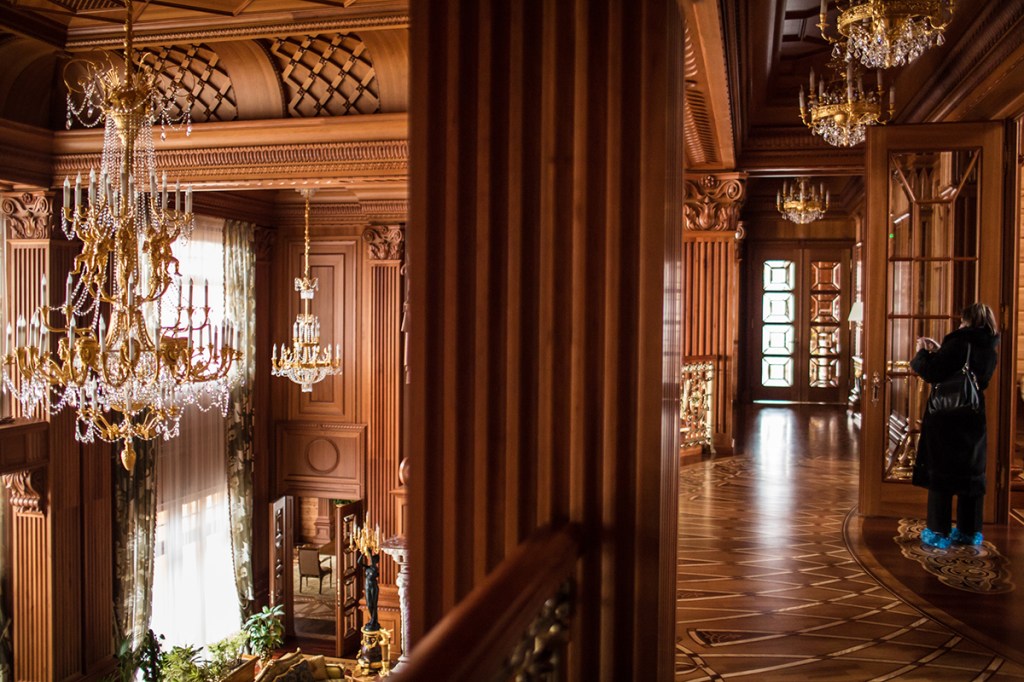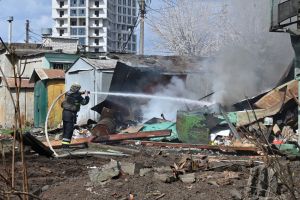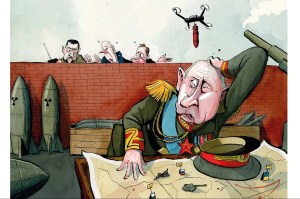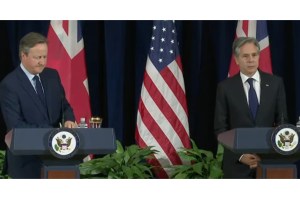Armed soldiers guard the barbed-wire compound. Helicopters buzz around the parameter, drifting above families on tandem bicycles. Groups of giggling bridal parties flirt with camouflaged guards. They watch on, careful to spot the light-fingered.
This is Mezhyhirya, the former playground of exiled Ukrainian president Viktor Yanukovych. The estate has been open to the public since the former communist fled to Russia in 2014 after a pro-western revolution. Adverts peddle the autocrat’s theme park as a pleasant family day out: a museum, wedding venue, water park and zoo.
Top of the bill is the main house, a bizarre building. In the words of a Ukrainian friend, ‘It’s as though a group of terrified architects asked Yanukovych, “What style would you like? Classical? Alpine? Baroque?” and the reply had simply been, “Yes”.’ Which classical architect designed the gold-plated bidet is anyone’s guess.
This was Yanukovych’s playground. Cars, a golf course complete with carts, luxury outbuildings, private waterways, and — perhaps most bizarrely — a series of tree stumps ascend the hill next to the building, arranged like stairs. Yanukovych claimed to be in such supreme physical condition that he regularly ran up and down the stumps 10 times. A brief video showing him struggling to climb just a few steps went viral.
There is a guesthouse reserved for Vladimir Putin, who now sponsors Yanukovych’s exile. It’s a modest building compared to the main attraction, the inverse of Mother Russia and its western former vassal. I asked the guards why we weren’t allowed in. No explanation has been issued to the lower ranks.
Catering to Yanukovych’s greed is a restaurant stowed away on a replica sailing ship on a private waterway. Its gilded bathroom and marble floors apparently cost $3 million. Nearby is an animal sanctuary where the ostriches that once ran freely around the grounds are now contained. Yanukovych famously claimed to have simply found the ostriches there — confusing, for an animal native only in Africa.
For a post-Soviet politician, Yanukovych’s car collection points to a man enthralled with the West: a 1950s-era Bentley, series of US army trucks and a 1980s American police car.
Even the private chapel’s Bible is covered in gold. The little church’s existence is symptomatic of the marriage between the Orthodox Church and corrupt politicians: it could never have functioned without the approval of patriarchal authorities. For something that was built a place of private worship, the chapel has held plenty of Ukrainian weddings — perhaps they think they’re getting one over their former dictator or even taking a little bit of the opulence themselves. Couples kiss in front of a truly unusual portrait of Christ: his likeness appears alongside the spear of Longinus, beneath him are a metal masonic hammer and a set of tongs, placed alongside – of all things — a skull and crossbones.
By all accounts, Yanukovych continues to live in luxury. While he may be enjoying himself, perhaps some small comfort can be taken from his exile: his gold bidet remains separated from him, and so too do the birds which are, according to Yanukovych, his strongest supporters. A dictator bereft of his country and his ostriches cannot be a happy man.
This article was originally published on The Spectator’s UK website.


















